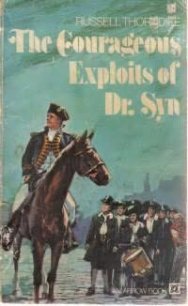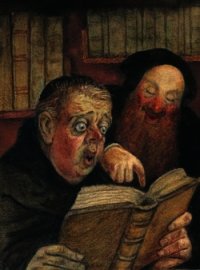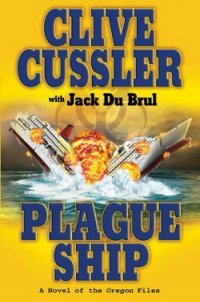Doctor Syn on the High Seas - Thorndike Russell (читать лучшие читаемые книги TXT) 📗
track. In three days’ time we shall be after him again. Are you willing
to risk your scalp amongst the Indians?”
“It’s your scalp. You bought it, sir,,” said Mipps. “In three days?
Then I’d best be purchasing a canoe, a barrel of rum, and eatables.”
“And I’ll make inquiry for a reliable guide,” said Syn.
Providing themselves with clothes more suitable for their journey,
they packed their seachests with such properties as they wished to
leave behind them, and deposited them in the same bank that was hoarding
their treasure. Syn then drew up an agreement with the banker that their
property should be handed over to one or both of them on personal
demand, but if neither of them came back within the year, the banker was
to sell jewelry and all, to the best advantage, and to send the value to
Solomon Syn, New Romney, England. Having
- 85 -
thus provided against emergency, Doctor Syn took leave of his many
friends in Albany, and set a northern course up the Hudson.
The Indian, who went by the high-sounding name of “Mountain Cat”,
proved himself at once to be efficient, very strong, but also very
silent. Knowing that the pastor’s object was to locate Nicholas and his
party, he went to work in his own way, seeming unperturbed at what Syn
and Mipps considered a gigantic and puzzling task. When Syn suggested
they might hail such craft as passed them, and ask if the party they
followed had been seen by them, he shook his head. He had his own
method, and it was curious. He would frequently head for the bank, and
that at places where his companions could see neither camp nor
habitation, disappear into the forest, but to return after an interval
and point once more with decision up -river. Syn let him go his own way,
but Mipps became cynical.
“Funny way of going on, I calls it,” he said when this method had
gone on for some days and nights. “Where the devil does old Puss -cat get
his information from? I never hears nothing but twittering of birds and
squawks of wild beasts?”
“He’s no doubt in touch with Indian tribes,” said Syn. “They’re a
silent race, and shy at showing themselves.”
“Unsociable, I calls it,” replied Mipps.
On one occasion the method changed, for instead of pointing up-river
he unpacked the canoe, hoisted it upon his shoulder, and signing them to
carry the provisions, set off through the woods. This was the prelude to
an incessant toil. Days and nights were spent in avoiding the worst
swamps, threading a way through what seemed impenetrable undergrowth, on
some occasions, scaling precipitous rocks in order to reach some other
river,
where the canoe could be refloated till its way was barred by thunderous
waterfalls.
Through all these trails, the Indian insisted not only silence should
be strictly observed, but also the greatest haste. At first they thought
he did this in order to finish the contract the sooner, but they had yet
to discover that his reason was the more alarming. They had been
traveling fast for many miles down a turbulent river, when the Indian
suddenly made for the shore. Above them hung a gaunt bare rock, which
their guide climbed rapidly as soon as he had seen the canoe made fast.
Syn and Mipps watched him, as his half-naked body squirmed its way t o
the top. He did not look over the crest of the crag, but lay still as
though listening, but as Mipps whispered to his master, “What Pussy
expects to hear with the noise of this damned trout-stream booming” was
beyond their ken. Presently he came down cau tiously, now and then
stopping to remove the marks of his own feet. It was obvious to the
others that this particular sport in the wilderness was known in every
detail by “Mountain Cat”, for no sooner had he rejoined them, than he
speedily unpacked the contents of the canoe and deposited them in a
hole, which he covered with dried leaves. He then pointed to a large
tree whose low branches interlaced with those of its neighbors. To the
base of this tree, he carried the empty canoe, which he leaned end up
against the trunk. Then, grasping the mooring-rope, he climbed to the
first branches and then up to the second. The thickness of the leaves
now hid him completely from night. The rope went tight, and the canoe,
swinging clear of the trunk, began to ascend aft er him. Syn and Mipps
hastened to ease the weight of it till it was pulled too high for their
reach.
“What does he want to go sailing in the tree -tops for?” whispered
Mipps.
- 86 -
“No doubt he has sensed unfriendly Indians,” replied Syn.
In a minute or so he had dropped once more to the ground, and
indicating with a stick the surest notches on the surface of the trunk
for hands and feet, indicated that they should climb it.
Up went Syn and Mipps, to find the canoe safely cradled across th ree
stout branches, which formed the most admirable dry dock. Indeed, so
secure was its position, that the companions took their customary seats
and waited. The Indian meantime busied himself by covering up the tracks
which their trampling had caused from the river to the tree. Then he
climbed the tree once more, and as though it was the most ordinary thing
to do, sat himself solemnly in the canoe with the others, where he
continued to sit with a warning finger to his mouth, commanding silence.
Syn and M ipps could hear nothing but the tumbling waters of the
river, whose music they were forced to listen to for some half-hour. It
was characteristic of Syn that even in this extremely odd and obviously
dangerous situation, he did not waste time. He produced a volume from
his pocket which had been given to him by the compiler, a mission parson
in Albany, who had done much preaching to the Indians. This book
contained a treatise upon the manners of speech employed by the Red
tribes, with a dictionary of all the useful words and phrases. Since
this worthy cleric had collected his material from amongst the
Adirondack Indians, it was likely to be of greater service to Doctor
Syn, who was now sitting up a tree in that very territory, as he had
learned from “Mountain Cat.”
Mipps spent his time in watching first his master and then the
Indian, who sat with eyes closed in mediation, but still holding his
finger to his lips. After a while the comically of thus sitting in a
boat up a tree overcame the control of his sense of humour. Attracting
his master’s attention he traced out invisible capital letters upon the
floor of the canoe, while tears of suppressed laughter ran down his
cheeks. Syn smiled too, for the little pirate had written, after jerking
his head towards the Indian, “Hush-a-by, Baby, on the tree-top.”
Sensing the movement of the canoe which Mipps caused at his writing
and shaking through silent giggles, the Indian, without opening his
eyes, pointed first towards the rock, and then straight down beneath
them. Through tiny peepholes in the thick foliage they looked. Upon the
highest crag of the rock, and silhouetted magnificently against the sky,
stood a feathered and war-painted Brave, shading his eyes against the
sun, and signaling with his murderous tomahawk to those beneath him.
These were in two files, one skirting the base of the rock and trotting
one behind the other, while the second file were passing close by the
very tree which concealed the canoe. This lot halted for some minutes as
though awaiting an order from the scouting Brave, and the three men, in




